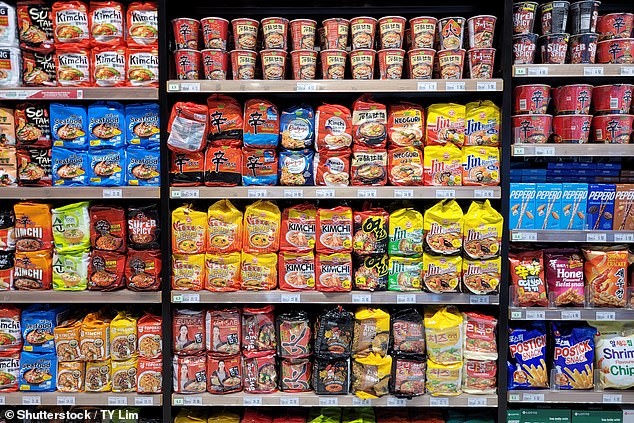A 13-year-old boy has reportedly died after eating three packets of uncooked instant noodles.
The unidentified teen from Cairo in Egypt, suddenly began feeling unwell around half an hour after consuming the dry noodles, according to local media reports.
But shortly after complaining of symptoms including severe abdominal pain, sweating and vomiting, he passed away.
The shopkeeper who sold all three packets of the instant noodles was initially questioned following the boy’s death, over concerns the product may not have met safety standards
But testing of the product and an autopsy found he had not been poisoned.
It was reportedly later confirmed that death was instead caused by either acute intestinal problems or digestive obstruction from eating a large quantity of raw noodles.
The case has since sparked debate locally over stricter protocols on processed foods and the additives they contain, local media sites said.
Additive-laden foods such as crisps and sweets have been vilified for decades over their supposed risks, with dozens of studies linking them to type 2 diabetes and other diseases.

It is feared that eating raw instant noodles can lead to severe dehydration and intestinal blockages, that can prove fatal
Consuming raw instant noodles has been a ‘challenge’ on social media for years, sparking its popularity as an uncooked snack.
Dubbed the ‘Eat Ramen Raw’ challenge videos have amassed millions of views on apps including Tiktok.
It is feared that eating raw instant noodles can lead to severe dehydration and intestinal blockages, that can prove fatal.
Experts have warned that it is not just uncooked that can have a negative impact on health.
A typical pack of instant noodles can contain as much as 1330 milligrams (mg) of sodium.
By comparison, the World Health Organisation recommends consuming up to 2000mg per day.
One recent study by researchers in South Korea found that frequent instant noodle consumption—more than twice a week—was associated with a higher risk of metabolic syndrome.
This is a group of conditions that together raises the risk of heart disease, diabetes and other health issues.
Writing in the Conversation, Professor Lauren Ball, from the University of Queensland, and Dr Emily Burch, from Southern Cross University, Australia, also said: ‘Over time, high sodium intake can strain the heart and kidneys.’
They also warn that a diet heavy on instant noodles can impact your digestive system.
‘Because they’re usually made from refined wheat (not wholegrains), instant noodles typically do not contain much fibre,’ they added.
‘Dietary fibre is important to help keep your digestion regular and support a healthy gut.’












